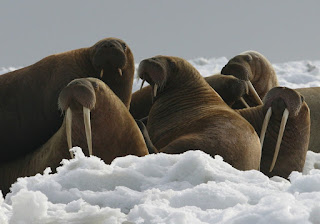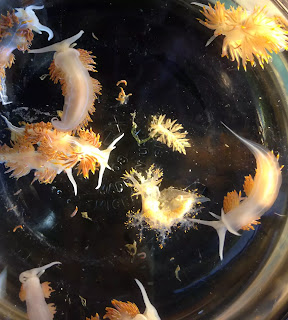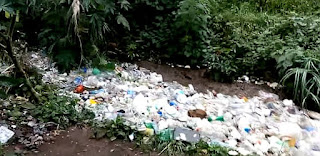1. Federal Government Refuses to List Walrus as Threatened Species
 The Trump Administration is denying walruses the status of threatened species. They say that the walrus is adapting to the vanishing sea ice by foraging along coastlines instead. “Walruses in the last decade have been forced ashore in unprecedented numbers, resulting in deaths, especially of young animals, and long swims for nursing females and other walruses to find food.” This decision, which wildlife groups say imperil the species, will likely be challenged in court.
The Trump Administration is denying walruses the status of threatened species. They say that the walrus is adapting to the vanishing sea ice by foraging along coastlines instead. “Walruses in the last decade have been forced ashore in unprecedented numbers, resulting in deaths, especially of young animals, and long swims for nursing females and other walruses to find food.” This decision, which wildlife groups say imperil the species, will likely be challenged in court.
-----------------------------------------------
2. Sharks Live Longer Than Previously Thought
 A scientist has found that sharks live longer, as much as twice as long, as previously thought. Dr Alastair Harry looked at 53 populations of sharks already being studied and found that a third of the species’ ages had been underestimated by as much as 34 years. This study is important for shark fishing management. Most sharks are not targeted but are caught as bycatch.
Read More...
A scientist has found that sharks live longer, as much as twice as long, as previously thought. Dr Alastair Harry looked at 53 populations of sharks already being studied and found that a third of the species’ ages had been underestimated by as much as 34 years. This study is important for shark fishing management. Most sharks are not targeted but are caught as bycatch.
Read More...
-----------------------------------------------
3. Protection Gained at CITES Take Effect for Silky and Thresher Sharks2. Sharks Live Longer Than Previously Thought
 A scientist has found that sharks live longer, as much as twice as long, as previously thought. Dr Alastair Harry looked at 53 populations of sharks already being studied and found that a third of the species’ ages had been underestimated by as much as 34 years. This study is important for shark fishing management. Most sharks are not targeted but are caught as bycatch.
A scientist has found that sharks live longer, as much as twice as long, as previously thought. Dr Alastair Harry looked at 53 populations of sharks already being studied and found that a third of the species’ ages had been underestimated by as much as 34 years. This study is important for shark fishing management. Most sharks are not targeted but are caught as bycatch.-----------------------------------------------
 A year ago, Sea Save Foundation was instrumental in getting silky and thresher sharks listed under CITES Appendix II. Implementation began October 4, which means that trade in those sharks is now regulated internationally to ensure their survival in the wild. CITES regulates the international trade of over 35,000 plants and animals.
A year ago, Sea Save Foundation was instrumental in getting silky and thresher sharks listed under CITES Appendix II. Implementation began October 4, which means that trade in those sharks is now regulated internationally to ensure their survival in the wild. CITES regulates the international trade of over 35,000 plants and animals.-----------------------------------------------
 The European Union and its private sector will announce a commitment of $1 billion to better protect marine life. The money will be used to further areas of action including climate change, sustainable fisheries and marine pollution.
The European Union and its private sector will announce a commitment of $1 billion to better protect marine life. The money will be used to further areas of action including climate change, sustainable fisheries and marine pollution.Read More...
-----------------------------------------------
5. Non-Native Marine Species Floating Across the Pacific on Plastic Debris
 “Between 2012 and 2017 nearly 300 species of marine animals arrived alive in North America from Japan, having traveled on crates and other objects released into the Pacific following the Japanese earthquake and tsunami of 2011.” Two-thirds of the animals--including mollusks, crustaceans, and worms--had never been found before on the West Coast of the United States. The discovery raises the alarm about the dangers of invasive species "hitchhiking" on plastic debris. Non-native species can wreak havoc on native ecosystems by outcompeting native wildlife.
“Between 2012 and 2017 nearly 300 species of marine animals arrived alive in North America from Japan, having traveled on crates and other objects released into the Pacific following the Japanese earthquake and tsunami of 2011.” Two-thirds of the animals--including mollusks, crustaceans, and worms--had never been found before on the West Coast of the United States. The discovery raises the alarm about the dangers of invasive species "hitchhiking" on plastic debris. Non-native species can wreak havoc on native ecosystems by outcompeting native wildlife. -----------------------------------------------
6. River of Trash Flows Through Guatemala

A river of trash flows through Chimaltenango, Guatemala, in a video taken in September. A city upstream “hides” its garbage, and during the rainy season, the trash flows downstream. Locals depend on this river for drinking water. A quarter of Guatemalans, and up to 50 percent in rural areas, don’t have access to clean drinking water.
Read More...
-----------------------------------------------
Be sure to "LIKE" http://facebook.com/SeaSave to ensure our "Week in Review" is delivered to your newsfeed every Friday.
Be sure to "LIKE" http://facebook.com/SeaSave to ensure our "Week in Review" is delivered to your newsfeed every Friday.
Sea Save Foundation is committed to raising awareness of marine conservation. The Week in Review is a team effort produced by the Sea Save staff to provide a weekly summary of the latest in marine research, policy, and news.